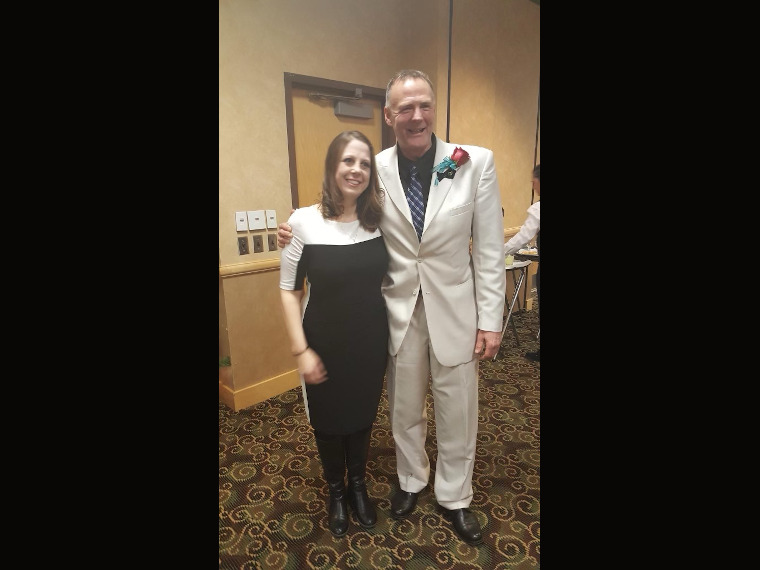Featured photo: Stevi Atkins; CEO of Wellness Services in Flint with Ken VanWagoner. Both Atkins and VanWagoner were nominees for the Sybyl Awards in 2016.
Written by Jameca Patrick-Singleton (editor/published by; Tanya Terry)
In this interview we are highlighting Stevi Atkins. Atkins is the CEO of Wellness Services. In addition to being a female CEO, she has a all-female leadership team and an all female board of directors.
Courier: Tell us a little bit about yourself.
Stevi: My name is Stevi Atkins and I am the current CEO of Wellness Services in Flint. This year I am celebrating my 20th year at Wellness! I hold many identities as a mother and a partner, an advocate, an educator and a person with disabilities actively working to be anti-racist. I’m passionate about the work we do at Wellness and the marginalized communities we serve.
Courier: You are a female CEO with a female deputy director and an all female board. Please tell us about that and what you think it means to the community and to young girls who may be watching you?
Stevi: Representation in general is just so important, and women are traditionally underrepresented in leadership, especially Black, brown and Indigenous women. When you can see yourself or the identities you hold represented in a career, you can begin to see yourself in that role as well. That’s huge! Wellness deeply values hiring those with lived experience and wants our staff to be reflective of the populations we serve. This extends to our board of directors as well.
I never grew up thinking I would be in a position to lead an organization. Now that I am raising my own daughter, I think about how her path will be shaped by watching me and how my own path was shaped by watching my mother. She endured a lot of trauma growing up. At 15, she left her home in one state and traveled alone to Michigan to find a safe haven with her grandmother. Soon after she arrived, her beloved grandmother passed away and she entered foster care. Despite those adversities, she started college after my younger brother was born and went on to become the first female college graduate in her family. I absolutely know that watching her set and meet her own personal career goals paved the way for me and my daughter to do the same.

In addition to an all female board, our internal executive leadership team is also an all female team. I am grateful for these ladies every day. They embody what it means to provide “community care”. They are the village, and they are willing to put in the work to ensure our clients have the resources and services they need. We have each taken our life experiences and used those experiences to help our community by mentoring staff and interns, sitting on local, state and national advisory boards and educating the community about the people we serve and the barriers they experience. Almost all of us have our own daughters and bonus daughters so knowing that the glass ceilings we have shattered will be nothing compared to what our daughters accomplish is really exciting. We are female leaders raising young female leaders!
Courier: Do you think women leaders have different challenges than their male counterparts? If so what do you think they are?
I do think that females in leadership have unique challenges. We are frequently expected to sacrifice our careers for our children and our children for our careers. We’re often told we have to pick one over the other and that we can’t have both. That’s an ideation that we female leaders have to continue to challenge. I do think that we can have both, but we have to be in an environment that allows for flexibility. It’s an unrealistic expectation that your personal and professional life won’t intersect. We have to make room for life to happen and I believe employers can do a better job with this. For example, Wellness offers staff a generous amount of PTO and we aren’t prescriptive with it. We don’t have a specific number of hours or days just for sick time or just for vacation time. If a staff member has PTO available and they need time off, they should use it as they see fit. Whether it’s to take care of a sick family member or because they need a self-care day or because they want to take a vacation…these are all valid reasons. It shouldn’t be up to an employer to say what PTO can be used for or to guilt a staff person for using the time to take care of themselves or their family.
There are many times I have been one of the only female leaders in the room or my ideas or knowledge have been challenged or silenced by men. There are some days where I struggle with imposter syndrome. Whew! Imposter syndrome can really be defeating if it’s not addressed! Do I deserve to be here? Could someone else do this job better? Did I make the right decision? It can be immobilizing if you let it. At the end of the day, I know that I can do this job and I have shown I deserve to be invited to the tables I am sitting at, but it took me addressing my own traumas to truly believe that.
It also means I have a responsibility to ensure that I am making space at the table for the faces or identities that aren’t there. I have a responsibility to push back when I don’t see all the faces at the table that should be there and to ask why. While female leaders are underrepresented overall, Black, brown, Indigenous and LGBTQ+ identified female leaders are all significantly underrepresented. As a white woman, it’s important that I use the privileges I do hold, to ensure inclusion and de-center whiteness.
Courier: Tell us a little bit about your journey to get to where you are.
Stevi: I began my time at Wellness as an intern. I was a new mom just sort of trying to figure out which sector of social work would be a good fit for me. From an early age I knew that I wanted to be a “helper” of some kind. My first internship was in a sector that felt more punitive than helpful. This is what caused me to seek out a placement where I was finding solutions for barriers the community faces rather than contributing to their hardships. I saw the critical work Wellness was doing and really wanted to learn more. Now here we are 20 years later, and I am wondering how it flew by so fast!
I really can’t say enough about how being connected to mentors has been the key to my success. Sybyl Atwood was one of the first mentors I encountered in my career. Something that she instilled in me was to never let a client walk out the door without connecting them to the resources they need. This has stuck with me over the years and it’s something I’ve passed on as I have had the opportunity to provide mentorship to others. While Sybyl was my first female mentor, she certainly wasn’t the last. I have been extremely lucky to receive mentorship from many female leaders over the years. I credit much of my success to their willingness to share their labor and lessons learned with me. They have helped me in navigating Wellness through some really challenging times and their support and confidence in me has given me much strength. Now I am in a position to offer that same support to others, and I want to ensure I see that responsibility through.
Courier: Tell us about your agency and the service that you provide to the community.
Stevi: Wellness was founded in 1986 by Jill C Ramseyer, a Genesee County Health Department nurse. As Genesee County began to see its’ first cases of HIV/AIDS, it was important to Jill that she find a way to connect People with HIV (PWH) and their loved ones with end-of-life resources. She began organizing other colleagues and friends to create a buddy system. A person could call the hotline and connect with a buddy that could assist. Sometimes assistance looked like finding a hospital bed for a family bringing a loved one home to die. Sometimes it was providing the person with companionship or socialization. Sometimes it was actual medical care. It’s important to remember how stigmatized HIV/AIDS was in the early days (and still is). It was not uncommon for patients to experience discrimination within the medical system. The fear-based campaigns about HIV only compounded that so it was important to Jill to find allies that were not afraid to treat or care for people with HIV.
Since those early days, Wellness has continued to develop robust support services for PWH. We provide medical case management services to help clients reach the medical goal of HIV viral suppression. Part of that is connecting them to an HIV treatment provider and medication when a person is ready. HIV treatment has dramatically improved the health, quality of life and life expectancy of people with HIV. Reaching viral suppression is important for two reasons, 1) a person with HIV reaching an undetectable status means that the amount of the virus in their system is low and replication of the virus has slowed or stopped and 2) once a person maintains viral suppression for 6 months or more and they continue taking their HIV treatment, they cannot transmit HIV. This is a newer very important discovery and essentially it means that when we connect people with HIV to HIV treatment, not only does the individual live longer but the risk for HIV in a community declines.
Over the years, we’ve continued to expand upon the foundation Jill and her colleagues built. In addition to our services for people with HIV, Wellness has expanded into serving communities that are disproportionately affected by HIV which include people who use drugs, LGBTQ+, and BIPOC communities. We have HIV/STI Prevention and Education services for high-risk populations as well as Harm Reduction programming for people who use drugs. We host an array of community awareness events throughout the year including Flint Pride. We are in a constant state of, “How can we better serve our clients? How can we better serve our community?”
Courier: What advice would you give Women leaders of the future:
Stevi: Set those goals. Find your allies. Look for mentors. Be a mentor. Unpack your trauma. Self-reflect. Invite others to the table. (And) always disrupt bigotry and discrimination when you have the opportunity to do so.


